
The ability to easily add tables to your website can be very useful. Tables help you sort and present data to visitors in a way that makes your information easier to understand.
WordPress offers a great visual editor, but there are some things that the default editor doesn’t let you do, such as giving you the option to create tables without having to learn code.
Although you can add tables manually to your content in WordPress if you know HTML (Hyper Text Markup Language) and CSS (Cascading Style Sheets), for most non-technical users, this is not a realistic option.
Fortunately, you can do just about anything you need done on a WordPress site with plugins, and inserting tables into your content with the click of a mouse is no exception.
In this step-by-step tutorial you will learn how to easily create and insert tables into your posts and pages with no coding skills required.
Adding Tables Into Your Content With WordPress
If you want to create and add tables into your WordPress content without touching code, the tutorial below will show you how to easily add tables into your WordPress posts and pages using a FREE plugin called TablePress.
WP Plugin – TablePress

A powerful and time-saving WordPress plugin that makes creating, editing and managing tables in WordPress a very simple and easy process is TablePress.
TablePress requires no knowledge of HTML, CSS, etc. The plugin provides a simple interface that allows you to easily edit table data. Your tables can contain any type of data, even formulas.
An additional JavaScript library can be used to include features like pagination, sorting, filtering, and more for your visitors. You can insert tables into your pages and blog posts using shortcodes and display tables using text widgets.
You can also import and export tables from/to CSV files (e.g. from Excel), HTML files, and JSON.
The plugin was created by Tobias Bäthge and is licensed as Free Software under GNU General Public License 2 (GPL 2).
Using TablePress WordPress Plugin – Tutorial
To create and add tables to WordPress, install and activate the TablePress plugin.
You can download the plugin here:
https://wordpress.org/plugins/tablepress
Or install it from your WordPress Dashboard …
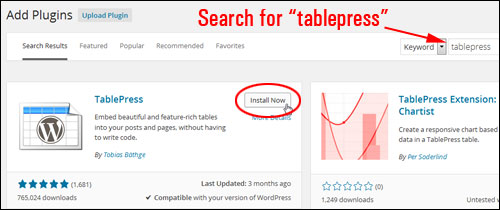
Once the plugin has been installed and activated, a new menu item will appear on your admin menu called TablePress …
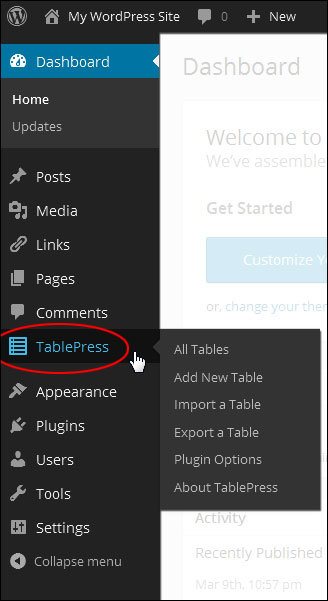
Click on TablePress and choose Plugin Options from the list of submenus …
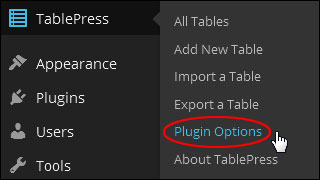
The “Plugin Options” area controls your plugin styling and display settings …
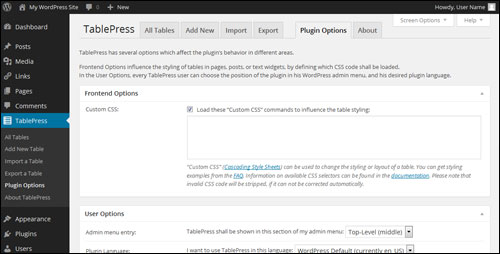
For example, in the “User Options” section, you can specify where the TablePress menu entry appears on your Dashboard menu.
By default, the menu item appears somewhere near the middle of your menu. If you plan to use this plugin a lot, then you can position the menu item close to the top of your admin menu by specifying “Top-level (middle)” on the User Options > Admin menu entry dropdown menu …
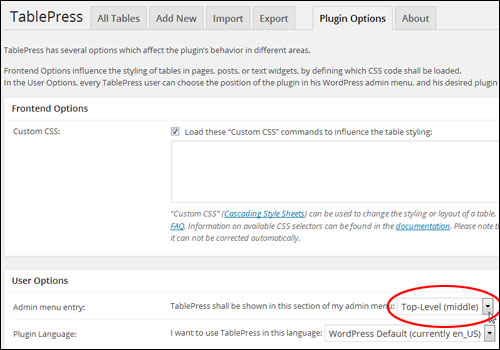
The TablePress menu item will now display towards the top of the menu list …
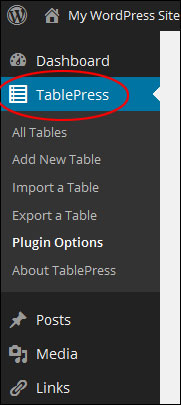
You can also specify other plugin options in the “Plugin Options” screen, such as formatting styles for your tables, default language, and so on. Leave all options as they are if you don’t need to change things in this area.
With TablePress, you create edit and format your tables within the plugin section. Tables are then added via a shortcode into your WordPress posts and pages. Your table will then display or update after your post or page is saved.
The benefit of doing this is that you can easily update the data inside your tables without having to open any of your pages and posts. The plugin then updates all of your table information inside all posts and pages where the table has been added to your content.
To create a new table select TablePress > Add New Table …
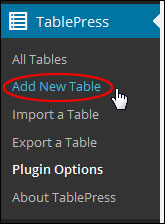
Enter a name, an optional description, and the number of rows and columns you would like for the new table into the “Add New Table” form in the Add New tab, and click on the Add Table button to create your new table. You can edit the name, description and size of any table you create at anytime…
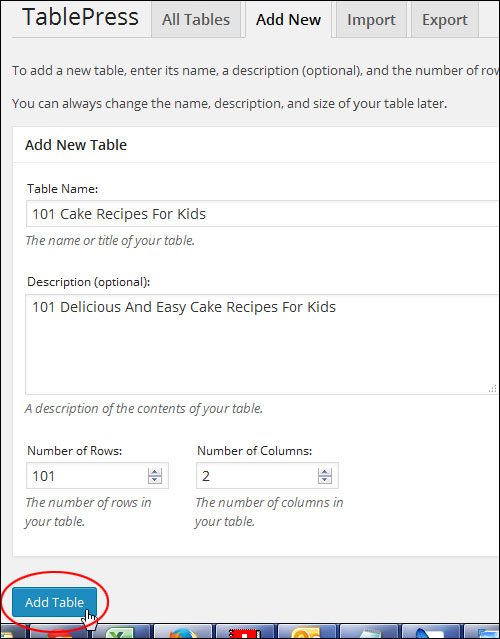
Once your new table is created, it will appear in the “All Tables” list and get assigned a unique Shortcode ID …
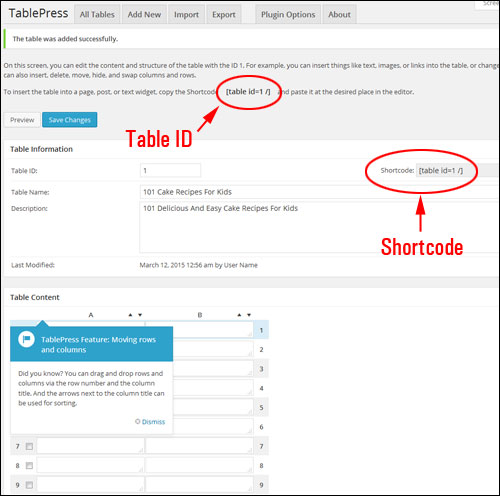
The TablePress shortcode allows you to easily add tables anywhere in your content simply by inserting or copying and pasting the shortcode wherever you want your table to display …
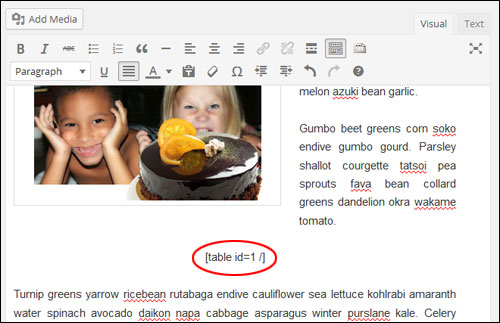
Once a new table has been created, adding content to it is very easy.
In the “Table Content” section, just click inside the cell and type or paste the content you want to display. You can add text, images and format your content (e.g. bold or italicize words, insert hyperlinks, etc …)
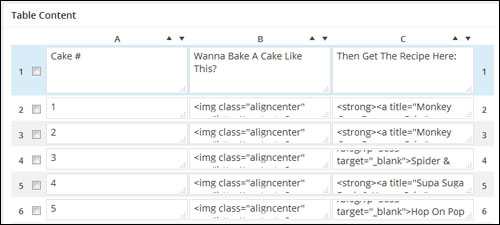
Once your new table is created, additional options appear that let you configure your table.
For example, in the “Table Options” area you can select the first row of your table to be the table header and the last row of the table to be the table footer, make the background of consecutive rows alternate in color, highlight a row when visitors hover their mouse over the table, print the table name and description above or below the table, and more …
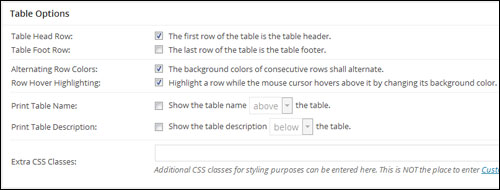
You can also edit your table after it has been created in the “Table Manipulation” section. You can perform a range of different edits on your table, such as adding links and images, hiding, showing, inserting, deleting and duplicating selected rows and columns, adding new rows and columns, combining cells, etc …

You can also enable JavaScript library features in your tables that will allow your site users to sort, filter and search your table content, set the number of table rows displayed on your page (and let visitors change the number of rows displayed), display table information, etc …
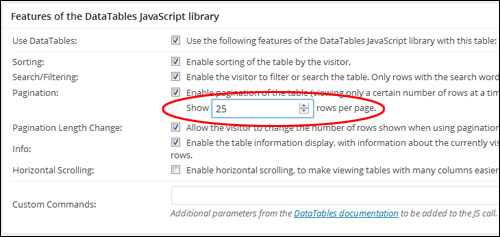
You can see how your table looks anytime, by clicking the Preview button …
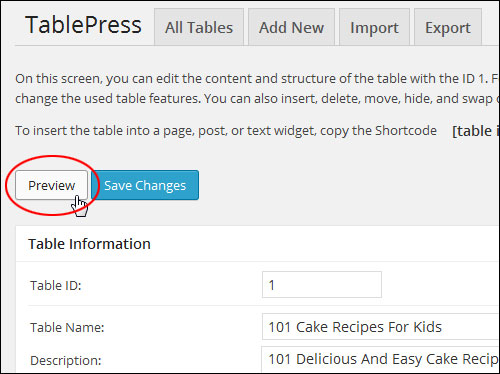
A preview window will open in your web browser allowing you to preview the table. Certain features like JavaScript options are disabled in preview mode, but will display when your post or page is published …
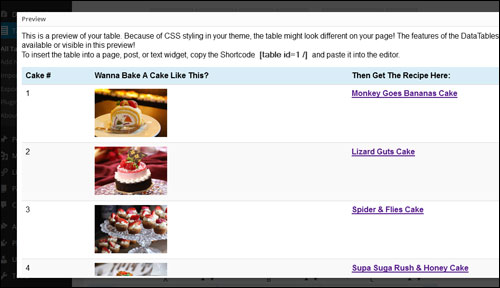
Click the Save Changes button after you are done editing to save your new table information …
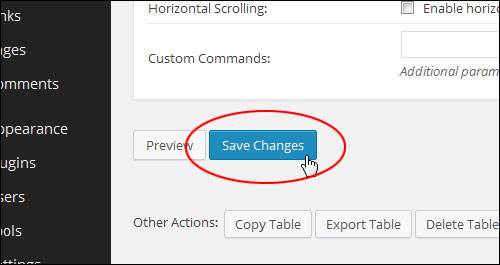
To view a list of all the tables you have created click on TablePress > All Tables …
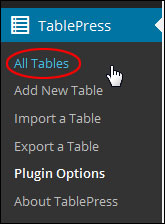
All the tables you have created are listed here. You can edit, see the shortcode, copy, export, delete and preview tables …
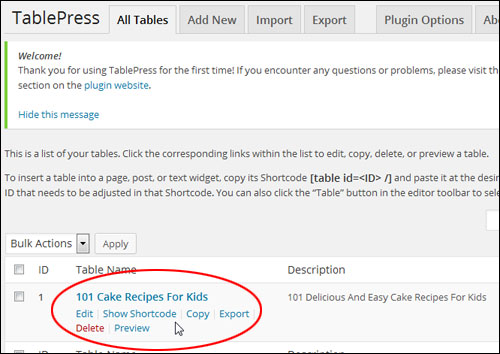
Using The TablePress Shortcode To Embed Tables Into Your Content
You can insert tables inside any page content using a shortcode.
Click on the Show Shortcode menu item below your table title to get the shortcode …
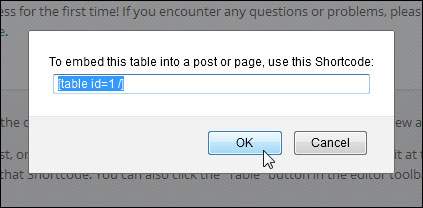
The plugin also adds a menu item to your WordPress content editor. This allows you to easily insert tables into your posts and pages while working on your content.
Place your cursor where you want your table to appear then click the TablePress menu icon …
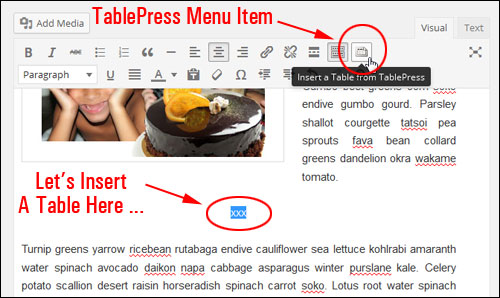
TablePress Menu Icon In WordPress Visual Editor Screen
Note: You can also insert a table when working in the “Text” area of the WP editor …

TablePress Menu Icon In HTML Editor Screen
Clicking on the menu icon opens a window containing a list of all tables.
Select the table you want to embed in the post or page and click Insert Shortcode …
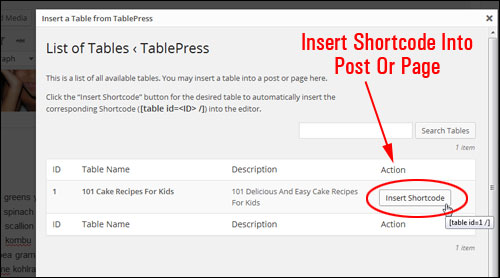
Your TablePress shortcode will be inserted …

The table contents will display as soon as you publish your post or page …

As stated earlier, one of the great things about TablePress is that you can edit information after publishing the table without having to open your post or page. Change the content in the plugin area, then save your new table settings and refresh your post to view the updated content.
Another great time-saving feature of this plugin, is that if you plan to keep adding new data to an existing table, just export your current table, then add new information, make changes, etc. You can then re-import your table file with the news changes and your table content will be automatically updated throughout your site.
To export a table, select TablePress > Export a Table in your admin menu …
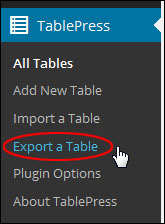
In the “Export Tables” section, select the table(s) you want to export (tip: select multiple tables by holding down the “Ctrl” key), then select the Export Format you want(e.g. CSV) and any other export options you’d like to make and click on the Export Table button to download the table file to your hard drive …
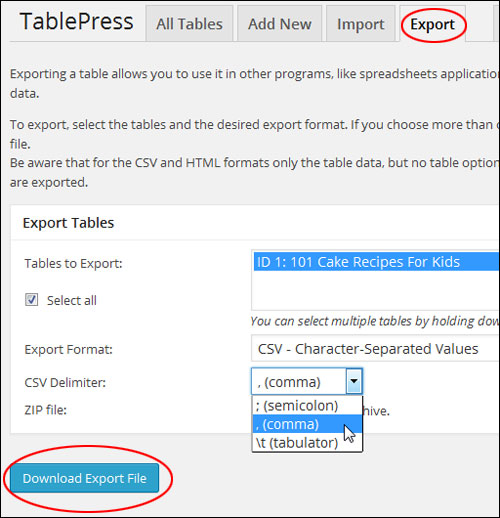
After editing and resaving your file, you can then easily reimport your table into WordPress.
To import a table, go to the menu and select TablePress > Import a Table …
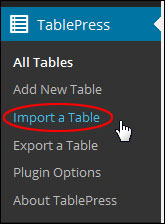
TablePress can import tables from existing data, such as CSV file data, from a spreadsheet application, an HTML file resembling a webpage, or its own format.
To import a table, select and enter the import source in the “Import Tables” area. You can import multiple tables from a compressed (ZIP) file and choose whether to import a table as a new table or replace an existing table.
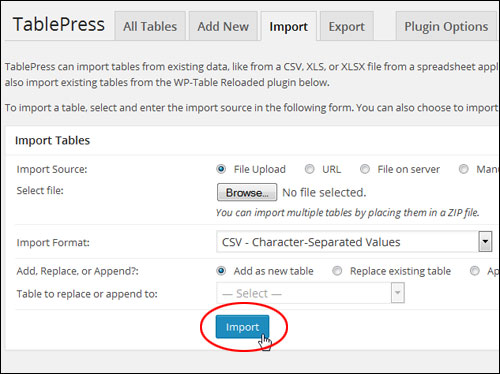
To learn more about using TablePress, including where to access documentation about extra features, or get plugin support, contact the plugin author, etc., click on the “About Tab” in the plugin admin section, or select TablePress > About TablePress …
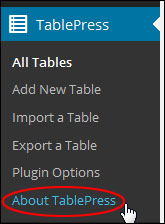
As you can see, TablePress is a very powerful time saving plugin that is free and will help you easily create and insert tables into your WordPress posts and pages.
***
"This is AMAZING! I had learnt about how to use WordPress previously, but this covers absolutely everything and more!! Incredible value! Thank you!" - Monique, Warrior Forum

